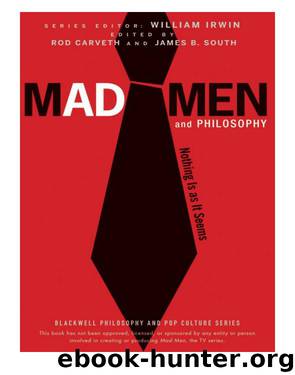Mad Men and Philosophy by William Irwin

Author:William Irwin
Language: eng
Format: epub
Publisher: Wiley
Published: 2010-05-10T04:00:00+00:00
Nine
CREATING THE NEED FOR THE NEW: “IT’S NOT THE WHEEL. IT’S THE CAROUSEL.”
George Teschner and Gabrielle Teschner
Advertising turns the strange and new into the familiar and necessary. We are led to believe that the products of industrialized society were needed before they were invented. It is difficult to accept that advertising crafted your needs for the toothbrush, the cell phone, and cruise control, but society collectively goes about approving and rejecting so-called necessities subconsciously on a daily basis. Our habits and expectations adjust accordingly. Think of the scene in which Sally Draper walks into her mother’s room with a plastic dry-cleaning bag over her head (“Ladies Room,” episode 102). We know instantly that this means danger, but Betty merely scolds her for emptying the bag’s contents. Someone at some time campaigned to plant the warning of choking squarely in our memory, just as ad agencies were instrumental in convincing us of the value of the family car over public transportation.
Advertising may be many things—communication, information, entertainment—but most of all, it is creative persuasion. In vitro fertilization, surrogate motherhood, smart bombs, and cell phones all have associated meanings that challenge our values. In Mad Men, we watch how advertising in technological society plays out in the lives of characters who are instrumental in creating it. During the late 1950s and early 1960s, technological innovations like diet soda, the Pill, Liquid Paper, and the Rolodex all had to be seen through the lens of a new system of values to be commercially viable. They had to be transformed from novelties into necessities.
In the absence of technology, humans would be fewer in number, would occupy much less of the surface of Earth, and would be confined to areas where there was a natural abundance of food. But humans could live without technology. It is not humans who need technology; it is technology that needs technology. Instead of drinking water from a forest stream, our need is met by turning on a faucet. The faucet, however, needs water to be collected in reservoirs. Engines and electric motors need to pump water through pipes that have been made from steel and plastic, which in turn need to be made at foundries and chemical plants. The needs spread across the entire web of technological society. One thing needs another, but are these our needs? Advertising convinces us that they are.
Download
This site does not store any files on its server. We only index and link to content provided by other sites. Please contact the content providers to delete copyright contents if any and email us, we'll remove relevant links or contents immediately.
| Coloring Books for Grown-Ups | Humor |
| Movies | Performing Arts |
| Pop Culture | Puzzles & Games |
| Radio | Sheet Music & Scores |
| Television | Trivia & Fun Facts |
Robin by Dave Itzkoff(2441)
Head of Drama by Sydney Newman(2302)
I'm Judging You by Luvvie Ajayi(2204)
The Paranormal 13 (13 free books featuring witches, vampires, werewolves, mermaids, psychics, Loki, time travel and more!) by unknow(2099)
Ten by Gretchen McNeil(1887)
Single State of Mind by Andi Dorfman(1816)
#MurderTrending by Gretchen McNeil(1658)
Key to the Sacred Pattern: The Untold Story of Rennes-le-Chateau by Henry Lincoln(1634)
Merv by Merv Griffin(1615)
Most Talkative by Andy Cohen(1592)
Notes from the Upside Down by Guy Adams(1474)
This Is Just My Face by Gabourey Sidibe(1469)
The Hunger Games: Official Illustrated Movie Companion by Egan Kate(1441)
Binging with Babish by Andrew Rea(1418)
Springfield Confidential by Mike Reiss(1416)
Jamie Oliver by Stafford Hildred(1390)
The TV Writer's Workbook: A Creative Approach To Television Scripts by Ellen Sandler(1349)
Clarkson--Look Who's Back by Gwen Russell(1342)
Blue Planet II by James Honeyborne & Mark Brownlow(1284)
